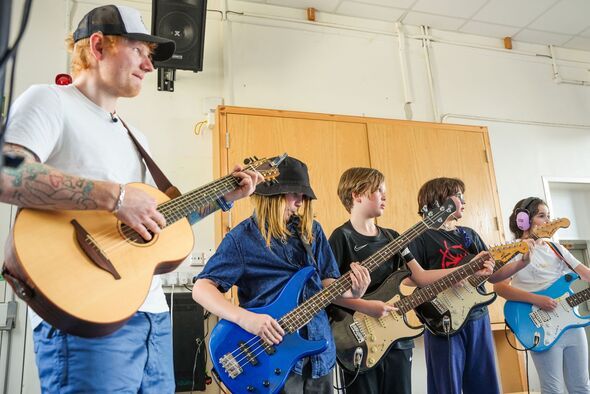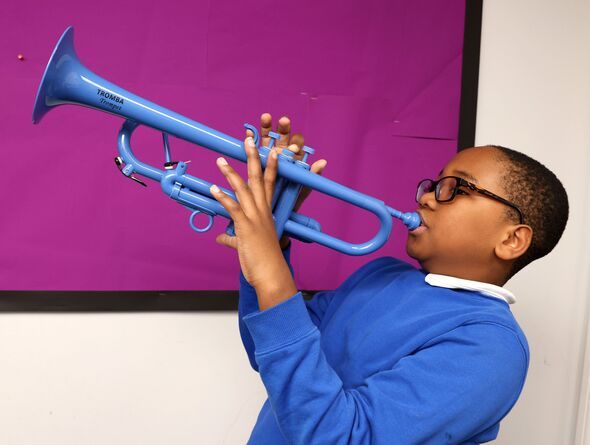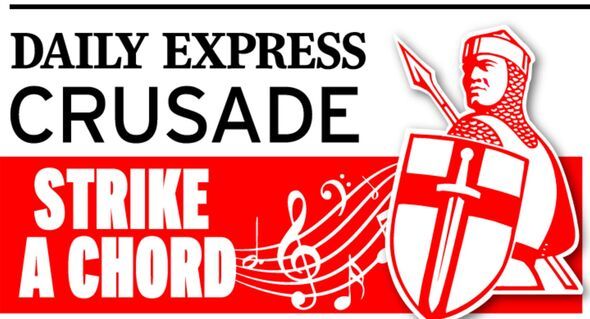

EXCLUSIVE
Britain's world leading music industry has reacted with joy that the highly controversial English Baccalaureate system - heavily criticised for squeezing out arts subjects in schools - is to axed.
The move signals a significant victory for the Daily Express' Strike A Chord campaign, with music leaders hailing the plans as a "great day for the next generation of creative talent".
The EBacc was introduced in 2010 as part of a plan to encourage pupils to take a suite of tough GCSE subjects including English, maths, science, a language and a humanity.
Schools that succeeded in getting a high proportion of their pupils to take the EBacc have been rewarded in performance tables.
But the measure prevented pupils from taking arts-based subjects meaning millions of children had to choose between taking just one subject such as music, drama or art whilst being forced to take multiple non creative courses.

The result was a dramatic near 50% plunge in pupil numbers studying music at GCSE and A-Level which threatened to strangle the talent pipeline feeding the nation's £7.6bn music industry. Music industry chiefs said unless amended then the decades of British superstars rulling the worldwide charts - from The Beatles and The Rolling Stones through to the likes of Ed Sheeran,Adele and Coldplay - could come to an abrupt end.
But now the Department for Education says removing the EBacc will enable pupils to swap either the language or the humanity for a creative subject will reinvigorate music education whilst continuing to prioritise science, maths and English.
UK Music Chief Executive Tom Kiehl said: "UK Music is delighted the Government is set to scrap the EBacc system and encourage pupils to pursue creative subjects like music. This move represents a huge victory for UK Music and everyone who has campaigned so passionately for this.
"It's a fantastic win for the Express's brilliant Strike A Chord campaign which recognises the huge value of music and how it can help transform lives.
"EBacc reform has been at the heart of our work on music education. A great music education is vital for the development of young people, and we are thrilled to see Government recognise its importance."
The move follows a review by professor Becky Francis, chief executive of the Education Endowment Foundation, who found that music had the highest disadvantage attainment gap of any subject at GCSE.
As well as getting rid of the EBacc, the review has promised arts GCSEs will be given "equal status to humanities and languages, recognising their value in boosting confidence and broadening skills for a competitive job market", which will be boosted by a "core enrichment entitlement" to ensure every child - whichever school they are at - has access to "sport, the arts and more".
Outlining its plans, the government said it would publish a new set of "enrichment benchmarks with schools asked to ensure every child has access to activities across five categories of enrichment". Ofsted will consider how these are met.
The government described its plans for scrapping the EBacc and an overhaul of Progress 8 - another performance measure - as one of its "key reforms".

"This follows the failure of the EBacc measure to encourage take-up of subjects including languages and constraining student choice," it said.
Arts Council England, which contributed to the review, described the plans as "a great day for the next generation of creative talent in England".
The new curriculum will be implemented in full from September 2028, with a final revised national curriculum published by spring 2027. The government said this would give schools four terms to prepare for the changes.


Often in campaigning, years go by and nothing seems to progress. And then sometimes change suddenly happens. After 15 years of campaigning against the EBacc which has caused so much damage to the arts in our state schools, Government has finally listened and the EBacc is scrapped.
It is a huge moment for everyone who has worked on this campaign - from Members of Parliament to music teachers, parents, arts organisations and even businesses who see the need for employees with a wide range of skills for their businesses to thrive.
In our state schools since 2010 we have seen arts subjects marginalised because of the EBacc - even though we know that in these stressful times access to an arts education in our schools is more important than ever to promote wellbeing and good mental health.
GCSE Music entries have fallen a staggering 25.6% since the EBacc's introduction in 2010 and 93% of music teachers said it has harmed music provision. There were plenty of us who warned of the EBacc's damage. There have been so many expert-led reports, Select Committee reports and campaigns including Bacc for the Future, #SaveOurSubjects, the Daily Express's Strike a Chord and more. All united in calling for room in the school day for creativity.
This reform doesn't push important subjects out to make room for others; it allows children to experience that broad education which equips them with the skills and knowledge they need for their next steps in life. The Curriculum and Assessment Review doesn't provide all the answers, and there is work still be done to make sure the government gets things right, but it's a start. We should be excited by the opportunities to grow creative education once more.
Thank you to the Strike a Chord campaign which helped make it happen.